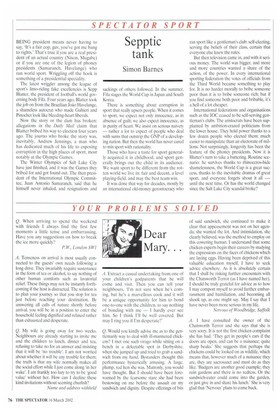Sepptic tank
Simon Barnes
BEING president means never having to say, 'It's a fair cop, guy, you've got me bang to rights.' That's true if you are a real president of an actual country (Nixon, Mugabe) or if you are one of the legion of phoney presidents (Samaranch, Havelange) who run world sport. Wriggling off the hook is something of a presidential speciality.
The latest wriggler among the league of sport's limo-riding fake excellencies is Sepp Blatter, the president of football's world governing body Fifa. Four years ago. Blatter took the job on from the Brazilian Joao Havelange, a shameless autocrat who made Galtieri and Pinochet look like bleeding-heart liberals.
Now the story or the dam has broken: allegations in the Daily Mail claim that Blatter bribed his way to election four years ago. The journo who broke the story was, inevitably, Andrew Jennings, a man who has dedicated much of his life to exposing corruption in the high places of sport, most notably at the Olympic Games.
The Winter Olympics of Salt Lake City have just finished, and it was the Games they bribed for and got found out. The then president of the International Olympic Committee, Juan Antonio Samaranch, said that he himself never inhaled, and resignations and sackings of others followed. In the summer, Fifa stages the World Cup in Japan and South Korea.
There is something about corruption in sport that really upsets people. When it comes to sport, we expect not only innocence, as in absence of guilt; we also expect innocence, as in purity of heart. We insist on serious naivety — rather a lot to expect of people who deal with sums that outstrip the GNP of a developing nation. But then the world has never cared to mix sport with rationality.
Those who have a taste for sport generally acquired it in childhood, and sport generally brings out the child in its audience. We want sport to be different from the rotten world we live in: fair and decent, a level playing-field, and may the best team win.
It was done that way for decades, mostly by an international old-money gerontocracy who ran sport like a gentleman's club: self-electing, serving the beliefs of their class, certain that everyone else knew the rules.
But then television came in, and with it serious money. The world was bigger, and more and more countries wanted a share of the action, of the power. In every international sporting federation the votes of officials from the Third World became something to play for. It is no harder morally to bribe someone poor than it is to bribe someone rich; but if you find someone both poor and bribable, it's a hell of a lot cheaper.
International federations and organisations such as the IOC ceased to be self-serving gentleman's clubs. The aristocrats have been supplanted by ambition-crazed politicians from the lower house. They hold power thanks to a few dozen people who elected them; much easier to manipulate than an electorate of millions. Not surprisingly, longevity has been the feature of the phoney presidents. Now it is Blatter's turn to take a battering. Routine scenario: he survives thanks to rhinoceros-hide shamelessness, the World Cup is a great success, thanks to the inevitable dramas of great sport, and everyone forgets about it all — until the next time. Or has the world changed since the Salt Lake City scandal broke?
















































































 Previous page
Previous page